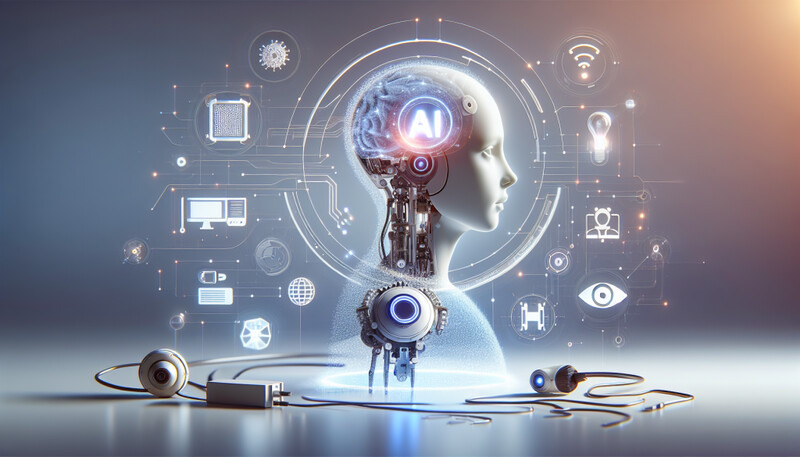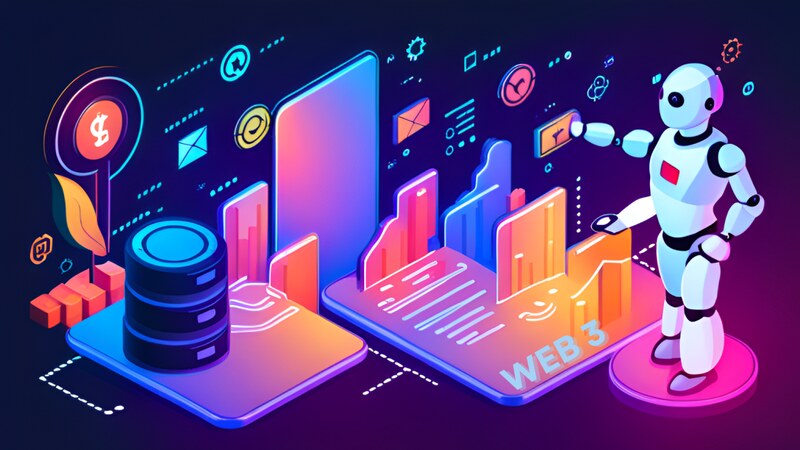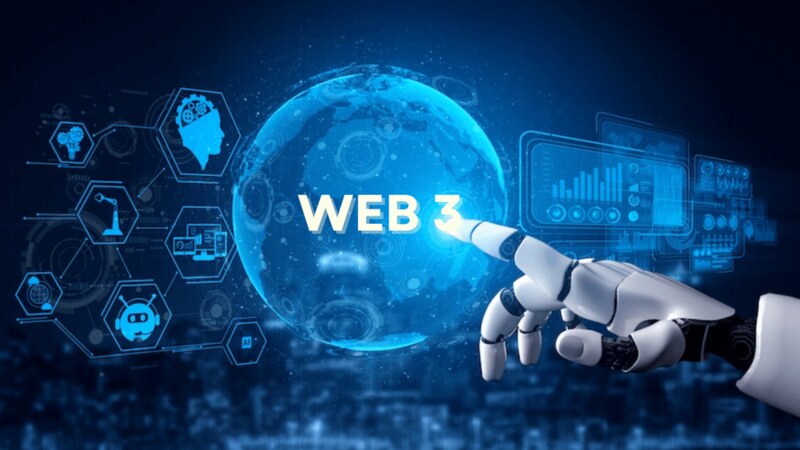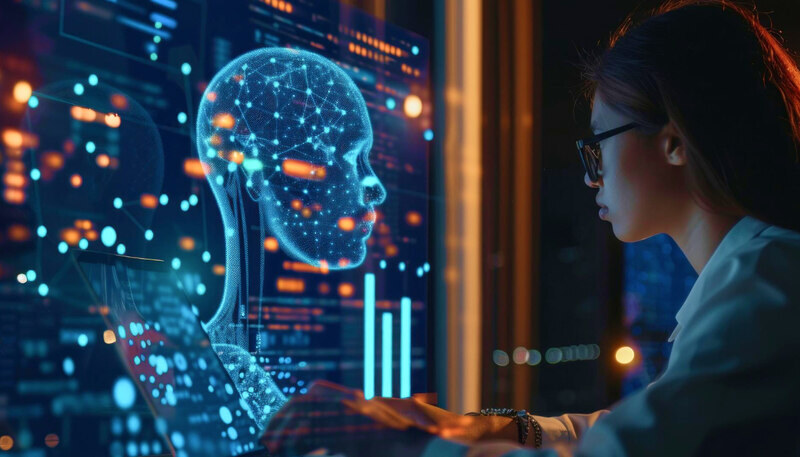Artificial intelligence is ushering in a new era for many industries, and its combination with blockchain has resulted in groundbreaking applications. AI Agents, intelligent automation systems, are actively being developed and deployed by Web3 platforms, laying the groundwork for extensive improvements. Let’s explore how AI Agents are changing the game in the Web3 space.
What are AI Agents?
AI Agents are automated software systems designed to perform specific tasks independently, utilizing artificial intelligence (AI) technology. Unlike generative AI models like ChatGPT, which focus on generating text from language queries, AI Agents operate with goals in mind and possess the capability to execute various complex tasks. AI Agents are typically programmed to:
- Automate processes: Carry out multi-step tasks continuously, such as retrieving and processing data.
- Assist users: Communicate and provide real-time solutions based on situational analysis.
- Make intelligent decisions: Analyze data, predict trends, or assist in financial activities.
In the blockchain and Web3 space, it play a crucial role in optimizing and automating complex processes, from data management to executing smart contracts.

The potential of AI Agents in Web3
Enhancing user experience
AI Agents have the ability to create rich and personalized interactive experiences for users on Web3 platforms. They can perform tasks such as:
- Customer support: It can quickly answer questions and resolve user issues 24/7, minimizing wait times and enhancing satisfaction.
- User behavior analysis: By collecting and analyzing data, AI Agents can gain a better understanding of user needs and preferences, thereby optimizing the interface and overall experience on the platform.
Automating processes
One of the standout benefits of AI Agents is their ability to automate complex processes, saving time and resources. Specifically, they can:
- Execute smart contracts: It can automatically carry out transactions and smart contracts without human intervention, reducing errors and increasing transparency.
- Data management: It can collect, analyze, and process vast amounts of data from the blockchain, helping to identify trends and predict market movements.
Enhancing security and transparency
AI Agents can play a vital role in ensuring the security and transparency of transactions on Web3 platforms:
- Fraud detection: It can analyze transaction patterns and detect unusual activities, thus preventing fraud before it occurs.
- Identity verification: It can assist in verifying user identities and ensuring that transactions occur safely and legitimately.

Optimizing transaction processes
AI Agents can optimize transaction processes on Web3 platforms:
- Market analysis: It can analyze market data in real-time, enabling users to make more informed investment decisions.
- Automated trading: It can be programmed to execute trades automatically based on market signals, helping users optimize profits without continuous monitoring.
Applications across various industries
The potential applications of AI Agents extend beyond blockchain platforms into numerous other fields:
- Finance and investment: It can help analyze portfolios and suggest suitable investment opportunities.
- Customer service: Web3 platforms can leverage AI Agents to collect customer feedback, thereby improving services and products.
- Education and training: Educational applications can utilize AI Agents to create interactive and personalized courses for learners.
Challenges in integrating AI Agents into Web3
Despite the numerous benefits AI Agents bring to Web3 platforms, integrating them into this ecosystem presents significant challenges. Here are the key issues to consider:
Data privacy and security
- Risk of sensitive information exposure: As AI Agents operate on Web3 platforms, they handle large volumes of data, including sensitive user information. This creates risks of data leaks or privacy violations.
- Lack of data control: It may manipulate data without close oversight, leading to poor management and difficulties in tracing data origins.
The ‘Black Box’ problem
- Transparency in decision-making: It often operate based on complex algorithms, making the decision-making process opaque and difficult to interpret. This results in scenarios where AI decisions cannot be audited or evaluated, raising concerns about fairness and reliability.

Compatibility with the Blockchain ecosystem
- Integration difficulties: AI Agents need to be compatible with blockchain protocols and standards, which may require significant adjustments or changes to existing system architectures.
- Development costs and time: Building and deploying AI Agents on Web3 platforms can be costly and may require a lengthy development, testing, and implementation period.
Data Ownership Issues
- Protecting data provider rights: When data is used to train AI Agents, issues of data ownership become complex. Who owns the data used, and are data providers fairly compensated?
- Encouraging innovation and participation: To keep developers and users contributing data and building the ecosystem, protective measures and incentives for participation are essential.
Training and Skill Development
- Demand for skilled workforce: Developing and maintaining AI Agents requires a highly skilled workforce knowledgeable in both AI and blockchain. This can pose challenges for many organizations, particularly startups or small businesses.
- Resource shortages: There may be insufficient resources to train personnel in a rapidly evolving tech landscape.
Legal regulations
- Lack of clear legal framework: While both AI and blockchain are advancing rapidly, the legal framework for the use of AI Agents in Web3 remains unclear, making compliance and legal safety challenging for businesses.
- Fraud and abuse risks: Regulatory gaps may lead to the misuse of AI Agents for fraudulent activities, impacting the transparency and reputation of the platform.
The future of AI Agents in Web3 platforms
As technology continues to develop robustly, AI Agents are gradually becoming a crucial element of Web3 platforms, promising transformative changes in how we interact with online applications and services. Here are the trends and future prospects for it:

- Transaction and smart contract automation: It can automate the execution of smart contracts, minimizing human errors and enhancing accuracy in transactions. By analyzing specific conditions and criteria, it can perform tasks without human intervention, boosting efficiency and reliability in transactions.
- Improving user experience: It will serve as intelligent virtual assistants, providing information and supporting users in navigating and interacting with data. They can personalize user experiences based on behaviors and preferences, creating more seamless and interactive experiences.
- Data analysis and prediction: With the ability to process and analyze large datasets, AI Agents can offer accurate predictions about market trends, enabling investors to make smarter decisions. By leveraging blockchain data, AI Agents can identify transaction patterns and provide insights, optimizing investment strategies.
- Enhancing security and privacy: It can bolster security for Web3 platforms by detecting and preventing fraudulent behavior or cyberattacks. They can analyze user behavior and identify suspicious activities, thereby protecting user data and privacy.
- Integration with new technologies: The development of technologies like the Internet of Things (IoT) and 5G will create opportunities for AI Agents to expand their operational capabilities. They can communicate and interact with other devices, resulting in new applications in smart home automation, supply chain management, and various other fields.
- Building decentralized ecosystems: It will help construct decentralized ecosystems where users can control their own data without relying on intermediaries. This will create a more transparent and trustworthy online environment where individuals can transact and interact safely.
- Shaping the future of Decentralized Finance (DeFi): In the DeFi space, AI Agents can automate processes such as lending, borrowing, and trading, reducing transaction costs and enhancing liquidity. They can also provide advanced analyses of financial products, assisting users in making better decisions.
- Transforming business models: It will create new business models, allowing companies to develop innovative services and products. By utilizing AI to optimize processes and enhance customer experiences, businesses can generate greater added value.
AI Agents are opening new doors within Web3 platforms. They not only facilitate automation and enhance efficiency but also help blockchain developers improve user experiences and bring this technology closer to the community. To fully harness the potential of it, Web3 developers must invest in and build transparent, secure systems that respect privacy. In the future, with new advancements, this technology will undoubtedly become a crucial part of Web3’s development journey.
To learn more about the potential and other applications of AI Agents in the Web3 platform and the investment finance market, be sure to follow our upcoming articles on Blockchain Global Network.

RELATED POSTS
Blast Airdrop – Tips for Earning KRO Tokens Easily
Earning KRO tokens from the...
Yala Airdrop – A Great Opportunity to Earn Free Tokens Today
Discover Yala Airdrop now –...
Is DeepSeek a Public Company?
Curious about the future of...
Pump.fun: The Easy Way to Launch Your Own Memecoin
Looking to create your own...
What is a Bullish Run? Exploring Its Impact on Investment Strategies
What is a Bullish Run?...
Remis Launches: A New Era in GameFi Innovation
On February 1, 2025, Remis...
What is Bitcoin Lightning Network? Revolutionizing Crypto Transactions
What is Bitcoin Lightning Network?...
Messari Crypto: A powerful tool for investors
In the world of cryptocurrency,...
Not Pixel Airdrop – Optimize Profits from Pixel
To optimize profits from Not...
Hana Network Airdrop – Detailed Guide to Receiving Tokens
This detailed guide will help...
PeckS Airdrop – Strategy to Receive $PeckS Airdrop
Participating in the PeckS Airdrop...
Vessel Finance: The DEX with near-zero gas fees
In the ever-evolving world of...
BitMart’s Strategic Move – A Lifeline for Pi Network’s Recovery in a Volatile Crypto Market
Pi Network, reeling from an...
HTX Airdrop – Tips for Optimizing Digital Asset Investment
HTX Airdrop is not just...
Binance Charity and the $1 Million USD Airdrop Campaign for Flood Relief
Binance Charity is a pioneer...
Exploring 2 Roles of Permissioned Blockchain
A permissioned blockchain restricts access...